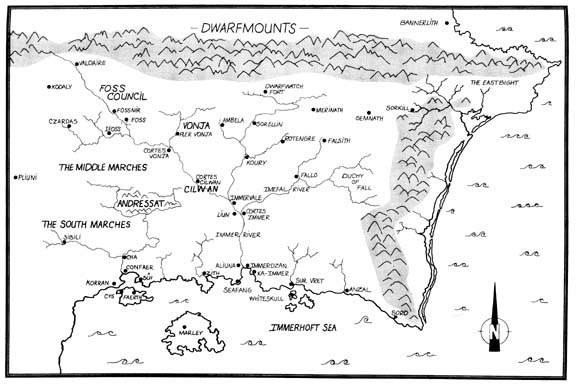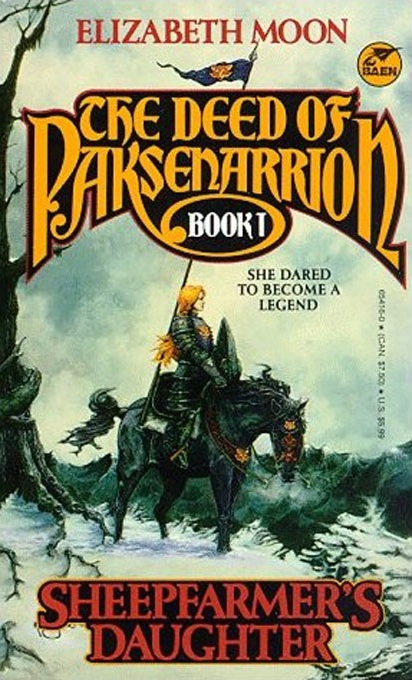The Deed of Paksenarrion
Read The Deed of Paksenarrion Online
Authors: Elizabeth Moon
Tags: #Fantasy, #Science Fiction, #Adventure, #Science Fiction/Fantasy

About this Book . . .
The Deed of Paksenarrion
Complete at Last in a Single Hardcover Volume—the Finest Trilogy of Epic Fantasy in a Decade
Paksenarrion, a simple sheepfarmer’s daughter, yearns for a life of adventure and glory, such as was known to heroes in songs and story. At age seventeen she runs away from home to join a mercenary company and begins her epic life . . . Book One: Paks is trained as a mercenary, blooded, and introduced to the life of a soldier . . . and to the followers of Gird, the soldier’s god. Book Two: Paks leaves the Duke’s company to follow the path of Gird alone—and on her lonely quests encounters the other sentient races of her world. Book Three: Paks the warrior must learn to live with Paks the human. She undertakes a holy quest for a lost elven prince that brings the gods’ wrath down on her and tests her very limits.
“Engrossing . . .” —Anne McCaffrey
“A tour de force . . .” —Jack McDevitt
“Worldbuilding in the grand tradition, background thought out to the last detail.” —Judith Tarr
“Superlative . . .” —Booklist
“Brilliant . . . the excitement of high heroic adventure . . . will enchant the reader.” —Bookwatch
 The Deed of Paksenarrion
The Deed of PaksenarrionElizabeth Moon
THE DEED OF PAKSENARRION
This is a work of fiction. All the characters and events portrayed in this book are fictional, and any resemblance to real people or incidents is purely coincidental.
The Deed of Paksenarrion
has been published in slightly different form as
Sheepfarmer's Daughter
, copyright © 1988,
Divided Allegiance
, copyright © 1988, and
Oath of Gold
, copyright © 1989.
All rights reserved, including the right to reproduce this book or portions thereof in any form.
A Baen Books Original
Baen Publishing Enterprises
P.O. Box 1403
Riverdale, NY 10471
ISBN: 0-7434-7160-1
Cover art by Keith Parkinson
First printing, October 2003
Distributed by Simon & Schuster
1230 Avenue of the Americas
New York, NY 10020
Typeset by Windhaven Press,
Auburn, N.H.
Printed in the United States of America

In a sheepfarmer’s low stone house, high in the hills above Three Firs, two swords hang now above the mantelpiece. One is very old and slightly bent, a sword more iron than steel, dark as a pot: forged, so the tale runs, by the smith in Rocky Ford—yet it is a sword, for all that, and belonged to Kanas once, and tasted orcs’ blood and robbers’ blood in its time. The other is a very different matter: long and straight, keen-edged, of the finest sword-steel, silvery and glinting blue even in yellow firelight. The pommel’s knot design is centered with the deeply graven seal of St. Gird; the cross-hilts are gracefully shaped and chased in gold.
The children of that place look at both swords with awe, and on some long winter nights old Dorthan, grandfather of fathers and graybeard now, takes from its carved chest the scroll that came with the sword and reads aloud to his family. But first he reminds them of the day a stranger rode up, robed and mantled in white, an old man with thin silver hair, and handed down the box and the sword, naked as it hangs now.
“Keep these,” the stranger said, “in memory of your daughter Paksenarrion. She wishes you to have them and has no need of them.” And though he accepted water from their well, he would say no more of Paksenarrion, whether she lived or lay buried far away, whether she would return or no.
The scroll Dorthan reads is headed
The Deed of Paksenarrion Dorthansdotter of Three Firs,
and many are the tales of courage and adventure written therein. Time and again the family has thrilled to the description of Paksenarrion in battle—the littlest ones pressing close around Dorthan’s knees, and watching her sword on the wall. They are sure it glows slightly when those tales are read.
And always they ask, the little ones who never knew her, what she was like. Just like that in the scroll? Always so tall, so brave? And Dorthan remembers her face the night she left, and is silent. One brother thinks of a long-legged girl running down errant sheep; the youngest remembers being carried on her shoulders, and the smell of her hair. Besides this, legend is all they have. “She’s dead,” say some. “She must be, or they wouldn’t have sent her sword.”
“No,” say others. “She is not dead. She is gone where she doesn’t need
this
sword.”
And Dorthan turns to the end of the scroll, which solves nothing . . . for the
Deed
is unfinished, ending abruptly in the middle of a stanza.
And one of those children, the little ones, has climbed from stool to table, and from table to mantelpiece, and touched with a daring hand the hilt of each sword . . . and then climbed down, to dream of songs and battles.

Sheepfarmer's Daughter
Chapter One
“And I say you will!” bellowed the burly sheepfarmer, Dorthan Kanasson. He lunged across the table, but his daughter Paksenarrion sidestepped his powerful arm and darted down the passage to the sleeping rooms. “Pakse!” he yelled, slipping his broad leather belt from its loops. “Pakse, you come here now!” His wife Rahel and three smaller children cowered against the wall. Silence from the sleeping rooms. “Pakse, you come or it will be the worse for you. Will you go to your wedding with welts on your back?”
“I’ll not go at all!” came the angry response.
“The dower’s been given. You wed Fersin Amboisson next restday. Now come out before I come in.”
Suddenly she stood in the mouth of the passage, as tall as he but slender, long blonde hair braided tightly. She had changed to her older brother’s clothes, a leather tunic over her own shirt, and his homespun trousers. “I told you not to give dower. I told you I wouldn’t wed Fersin or anyone else. And I won’t. I’m leaving.”
Dorthan glared at her as he wrapped the belt around his right hand. “The only place you’re going, you arrogant hussy, is Fersin’s bed.”
“Dorthan, please—” began Rahel.
“Quiet! She’s your fault as much as anyone’s. She should have been spinning at home, not running out on the moors hunting with the boys.”